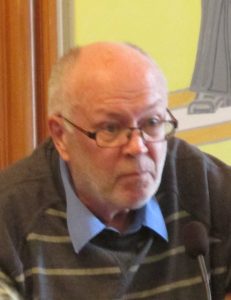Reykjavik 2017 – Speakers
Peter Abrahamson 
Ph.D. Associate professor of Sociology, Department of Sociology, University of Copenhagen.
Title:
Basic Income – Completion of Social Citizenship or Acceptance of Marginalization?
Abstract:
The presentation falls into two parts. The first one recalls my scholarly encounter with the ideas, discussions and practices surrounding the concepts of negative income tax, guaranteed minimum income and basic income from the 1970s into the 1990s with three focal points: The War on Poverty in the USA in the 1960s and early 1970s (Johnson & Nixon administrations); Danish debates following the Oil Crisis of the mid-1970 inspired by Revolt from the Center (1978), André Gorz (1981-83) and Erik Christensen (1990); European debates triggered by the fear of social dumping and social tourism following from the European Union project (Guaranteed minimum income recommendation network 1990-92; BIEN 1983[86]). In all three cases Basic Income (or the functional equivalent) was viewed as the solution to a major societal crisis of social integration (welfare dependency, mass unemployment and jobless growth) . During this period I came to appreciate the idea, perhaps rather intuitively and motivated by great sympathies and admiration for the Left leaning colleagues that promoted it. During the period of prosperity and post-neoliberalism from 1997 and onwards I continued to work on marginalization and social exclusion in an environment where the discussion on basic income had suddenly become very silent.
The second part of the presentation outlines my reflections on Basic Income provoked by an overwhelming and encompassing resurfacing interest in the idea currently everywhere from Latin America to East Asia, and now Norden, in part provoked by a fear of lack of jobs because of technological development (robots, AI) and contemporary relative high rates of youth and new graduates’ unemployment. It focuses on three elements: the welfare regimes and the polities which in the main promote the idea – neoliberals and conservatives in liberal regimes; the seemingly inevitability of setting the basis very low – the ‘law’ of less eligibility; and, most importantly, the implicit acceptance of marginalization from the labor market and exclusion from consumer society. This sums up to viewing Basic Income as perhaps not such a good idea because it on the one hand does not address the problem of an increasingly inhumane work environment (the precariat [Guy Standing]) and on the other hand does not avoid the negative (exclusive) consequences of a life – temporarily or permanently – outside work society.
The presentation concludes, firstly and pragmatically that in societies with little inequality and relatively low levels of unemployment like the Nordic countries Basic Income can be an improvement as a substitution for means- needs- and work- tested social assistance, but not for sickness- and unemployment benefits and disability and early retirement pensions. Secondly, and more ideally, it is suggested to return to Gorz and the young Karl Marx with their emphasis on work as creation, fighting for humanizing the work environment and making it an inclusive one, where there is space for everyone, instead of adopting Basic Income as a way of administrating the poor outside of main stream society.
Marina Gorbis
Margina is a social scientist and at the Institute for the Future (IFTF) in Silicon Valley. Her current research focuses on how social production is changing the face of major industries, a topic explored in detail in her book, The Nature of the Future: Dispatches from the Socialstructed World.
Title:
Universal Basic Assets
Abstract:
Reflecting on decades of income data, Thomas Piketty and colleagues recently concluded that: “policy discussions about rising global inequality should focus on how to equalize the distribution of primary assets, including human capital, financial capital, and bargaining power, rather than merely discussing the ex-post redistribution through taxes and transfers.” In other words, UBI may have great value but by itself it cannot serve as a solution to the vast and growing problem of extreme income inequalities. When 8 men own as much wealth as the bottom 50% of the world population, we need more drastic measures in order combat extreme inequality but to also maintain a level of social cohesion required for functioning democratic societies.
Institute for the Future has been advocating the notion of Universal Basic Assets, policies and finance mechanisms to equalize access to various types of assets—private, public, and open. Marina Gorbis, Executive Director of IFTF will share the latest thinking on the subject and the range of innovative efforts the Institute and others are engaged in to pursue Universal Basic Equity.
Jouko Hemmi
Jouko is a senior citizen in Finland, a Co-founder of the BIEN Finland association and has had leading positions in administration and marketing of public and commercial tourism on international front.
Title:
Introduction of UBI for star project to enhance Nordic Cooperation
Abstract:
The number of Finland’s unemployed has been persisting in from 250 000 to 300 000 people (on average about 10 per cent of the labour force) since beginning of 1990’s. Their societal, economic and social status is abruptly changed if they lose their adequate standard of living, their adequate food, clothing and housing and they cannot keep up their continuous improvement of living conditions. This is the prompt, crucial shift of their life into a completely different status where another kind of statutes and laws immediately – and rigorously – start defining their every day life. Like that anachronistic social ”security” system of Finland.
In my presentation, I emphasize some philosophical viewpoints of the contents of work and how unemployment has been regarded as economic problem.
In Finland there is a constellation of interest organisations comprising representatives of employers, employees and the State (via Government) – a symbiotic, undemocratic power apparatus for making nationwide decisions which belong to the democratically-elected political bodies. In this specific context I examine shortly the status of Nordic Council that has been blamed for lack of power. I emphasize its importance for Nordic cooperation. NC should be saved from such setbacks because it can be utilized for the Nordic UBI society, e.g. in its potential star project.
Birgitta Jónsdóttir
Poetician/parliamentarian for the Pirate Party in the Icelandic Parliament & chairman for IMMI
Title:
UBI and a nation state: how to collect the data and popular support
Markus Kanerva
Markus is an economist and has participated in the expert group preparing the basic income experiment to take place in Finland in 2017. He is the founder of Tänk, an independent Finnish think tank, where he actively participates in research activities. Tänk proposed in 2014 that a field experiment about the effects of basic income should be done in Finland. Currently Markus is also working part-time at the Prime Minister’s Office in Finland supporting additional field experiments to take place.
Title:
The Finnish Basic Income Experiment
Abstract:
The Finnish basic income experiment is probably the most often cited current UBI experiment in the international media. Flocks of journalists from all around the world come to Finland to learn more about it. Admittedly the experiment has some merits but it is not perfect by any means. This presentation will guide you through the Finnish experiment and give you an insider’s view why it turned out to be what it is today and what can be learned from a government lead experiments.
Martin Bruun Michaelsen
Studies Applied Philosophy on Aalborg University, Denmark. Is a trainee in the Danish department of BIEN starting this conference.
Title:
Work and its relation to a Basic Income
Abstract:
The concept of “work” has a remarkable place in the modern society. The difference in what counts as “real” work and what “just” counts as work is important in the case of basic income. When we, in todays society, talk of “real” work, what usually implied is labour. Labour is the necessary things we need to do for self preservation, and in today’s discourse, the “job” is where most of our labouring hours are spent. What time is left is then used on either leisure or other kinds of work, which both have a value different than that of labour, but nonetheless an important one.
How basic income is implemented and conceptualized can radically alter the perceptions on work and labour, not withstanding the relation and value between the two. What counts as “work” in today’s society, and what kind of work would be more or less valuable if basic income is implemented, is important to clarify, if the concept of a basic income shall become meaningful and understandable to the broad public.
Stefán Ólafsson
University of Iceland.
Title:
The Pros and Cons of Unconditional Basic Income
Abstract:
I will talk about how the Nordic Welfare States provide secure minimum incomes for different social groups at present, within the framework of universalist citizens’ rights. Iceland will be the prime example, but with some comparative references.
The different schemes will be outlined and the amounts of different minimum income guarantees provided. These will be put into the context of amounts of UBI discussed in other countries, either as universal unconditional basic income for all (rich and poor) or as a minimum income guarantee for those in need.
Then we examine the goals and means of UBI, differing understandings of UBI, and probe how they relate to the contemporary welfare state structures, particularly in the Nordic countries. We ask if UBI is the best way to reduce poverty and inequality and to tackle changes in the labour market (already increased precarity of work and looming increase of mechanization of jobs in industry and services). Lastly I suggest some ways in which the present discussion about UBI can be used to improve and simplify the workings and
outcomes of contemporary welfare states, particularly for those in greatest risk of poverty and social exclusion.
Gerður Pálmadóttir 
Entrepreneur and board member of BIEN Iceland.
Title:
We are the society
Abstract:
At birth we all become a part of a society. However the tools to equal opportunities to cope and participate in it is not automatically provided, poverty and inequality suppresses the bigger part of mankind. Never before in history has there been better circumstances to create societies offering equal opportunities to all in a world of plenty, highly developed technology and possibility of equal wealth distribution. Today´s obvious equality kit to has to be a basic income to cover shelter, food and education which are the basic tools needed, those tools give the chance to discover where own talent and interest which will improve daily life and benefit the whole society as well. Basic Income is the most obvious tool to abolish poverty and equalise opportunities according to many influential people of different race, with different views and social backgrounds. Many of those people have in the past and are now having profound impact on society such as Martin Luther King, Milton Friedman, Yanis Varoufakis, Elon Musk who all agree that Basic Income is the inevitable way to a future based equal opportunities and democratic values. Basic Income for all is ground braking in order to democratise power capitalism which today is disintegrating societies and destroying nature at imcomprehended speed. The solution is simple but its implementation has to be taken carefully step by step in accordance with different cultures in order to reach international desired results. 
Eliza Reid
Eliza Jean Reid, the First Lady of Iceland, was born in 1976 in Ottawa, Canada. Eliza is Co-Founder of the acclaimed Iceland Writers Retreat and has been active in volunteerism in Canada, the UK, and Iceland. Since founding her own company in 2008, Eliza has undertaken numerous writing, editing, and event management assignments. She moved to Iceland in August 2003 and in the following year she married Gudni Th. Johannesson who was elected President in Iceland in 2016.
Albert Sigurðsson
Albert is an environmental greographer and the chairperson for BIEN Iceland.
Title:
There and back again -a time travel
Abstract:
Implementing universal basic income and developing a sustainable society will go hand in hand in the decades to come. Both will require similar approaches for policy implementation, including direct democracy, increased transparency and more individual rights. Both will require some degree of diffusion of power. In the talk an attempt will be made at backcasting, i.e. telling a history from a future perspective and how incremental changes lead to that certain point.
Øyvind Steensen
Øyvind is a visual arts designer and the spokesman for BIEN Norway.
Title:
The welfare model in Norway
Abstract:
UBI in Norway as a natural continuation of the Norwegian/Nordic welfare model and what has worked here. UBI in light of the history of the welfare state, current developments and the society we are entering into.
Karl Widerquist

Karl is an American political philosopher and economist at Georgetown University-Qatar.
Title:
The Political
Economy of Basic Income Trials
Abstract:
This presentation argues that trials aimed at raising the level of debate have an exceedingly difficult task. UBI almost defies testing. Researches end up studying something close to but not quite UBI or UBI along with other factors that won’t be present when the policy is introduced on a large scale. Some of the most important questions in the debate cannot be addressed by a trial. Others can only be investigated indirectly. Implementation trials are particularly vulnerable to the “streetlight effect”—in which less important questions receive exaggerated attention simply because they are easy to investigate—and to “spin”—in which some results are given a biased and perhaps overemphasized importance to achieve a political objective. No matter how well the study is conducted, its findings are vulnerable to misunderstanding.
If the trials are going to be valuable, decision makers involved will have to understand the political economy of the UBI debate and the relationship of trials to it. People designing trials need to begin with an understanding of what is being debated, and craft trials to address the most important questions as well as a trial can. People reporting and writing about the trials findings need to understand the extent to which those results answer the questions actually being debated so that they can relate the findings to those questions. People reading about results need to understand the ways in which they’re vulnerable to spin. This presentation discusses the political economy of UBI trials—and all the difficulties involved in conducting one that raises the level of debate—in an effort to draw lessons about how best to design trials and interpret their results.
Jurgen De Wispelaere
Jurgen De Wispelaere is a former occupational therapist turned political theorist and policy scholar. He is an ISRF Political Economy Research Fellow, Independent Social Research Foundation and Policy Research Fellow at the Institute for Policy Research, Universiy of Bath. Previously he was a Visiting Research Fellow at the University of Tampere (Finland).
Title:
Experimenting with Unconditional Basic Income: A Plausible Route to Implementation?
